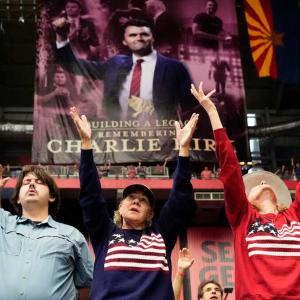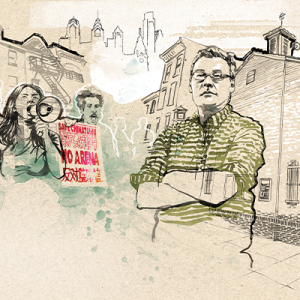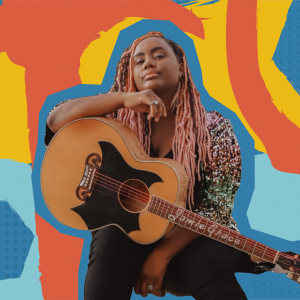
Darren Saint-Ulysse is an associate editor at Sojourners magazine. He is a child of Caribbean immigrants to the U.S. and was born, raised, and educated in New Jersey, where he currently resides. Darren holds a Th.M. and M.Div, from Princeton Theological Seminary, and a B.A. in sociology from Princeton University.
In addition to his work at Sojourners, Darren is a musician for various worshiping communities in New Jersey and Pennsylvania, an academic tutor, and a board member at Peacemakers Coalition. He previously was content curator at The Witness: A Black Christian Collective and a campus minister at Princeton University. Outside of work, Darren enjoys spending time with family, listening to podcasts, reading good journalism, thinking about the sports and news media landscape, and bemoaning the fact that the New Jersey Nets moved to Brooklyn. He also can often be found trying to, for some reason, keep his MVP Baseball 2005 game as up to date as it can be on a Nintendo GameCube.
Darren firmly believes that the U.S. should institute permanent daylight saving time … and is very grateful that “out of the infinite riches in Jesus/ God giveth, and giveth, and giveth again.”
Posts By This Author
At Charlie Kirk’s Memorial, Worship Took a Backseat to Trump
You may have heard that, at Charlie Kirk’s memorial service, Erika Kirk said that she forgave her husband’s assassin.
You may have also heard that only a few minutes later, President Donald Trump said that while Charlie Kirk “did not hate his opponents—he wanted the best for them,” he was different: “I hate my opponent, and I don’t want the best for them!” This moment got a lot of attention, understandably so, but another moment stuck out to me even more. And even though we’re almost a week and a half removed from the memorial service, I think it’s still worth exploring today.
What Happened After Jemar Tisby Started A Network for Black Christians?
Full disclosure: It’s entirely possible you wouldn’t be reading this interview right now if not for its subject. Let me explain.
In 2013, Jemar Tisby and Phillip Holmes, co-founder of the organization then known as the Reformed African American Network, started a podcast called Pass the Mic.
A Pastor’s Second Call
He wanted to save Philadelphia’s Chinatown — and found himself in the middle of a movement.
If you drove down Filbert Street in Center City Philadelphia in February 2025, you might notice a few things. The street is not very wide. There’s a train station. And a large, boarded-up building, surrounded by fencing—it used to be a Greyhound Bus terminal. A sign on a pedestrian walkway says “Fashion District.”
Soon, you’d see an “All Traffic Must Turn Left” sign. And since you are traffic, you turn left — and quickly realize you’re in Chinatown. Make another left to Arch Street, and you’ll find Chinese characters on almost every storefront, even on “The Bank of Princeton.” On nearby Race Street, there’s a historical marker that reads:
Philadelphia Chinatown
Founded in the 1870s by Chinese immigrants, it is the only “Chinatown” in Pennsylvania. This unique neighborhood includes businesses and residences owned by, and serving, Chinese Americans. Here, Asian cultural traditions are preserved and ethnic identity perpetuated.
But remember Filbert Street and that boarded-up bus terminal? In summer 2022, the National Basketball Association’s Philadelphia 76ers announced that they wanted to build an 18,500-seat new arena right there, taking up a third of the Fashion District (a shopping mall formerly known as The Gallery), sitting directly above the train station, connecting to the old Greyhound terminal, and removing Filbert Street from the city grid. At the time, the bus terminal was in use, not fenced off — isn’t it funny how things can sometimes work out just how billionaires want them to?
Residents, especially those from nearby Chinatown, almost immediately raised concerns. Two Pennsylvania-based organizations — the Asian Pacific Islander Political Alliance and Asian Americans United — formed a coalition to oppose the building of the arena; about 50 other organizations soon joined. A 2023 survey by the Philadelphia Chinatown Development Corporation found that 93% of business owners and 94% of residents opposed the arena, citing concerns about gentrification, parking, traffic congestion, the deterioration of Chinatown’s culture, and increasing rent and displacement.
Some faith leaders, eager for the jobs new construction might provide their congregants, supported the arena. Many others, including clergy from Black, mainline, and Catholic churches, joined the coalition to protect Chinatown — even though most of their congregations weren’t located there. They were allies. But they weren’t motivated by immediate existential threats to their community.
And then, there was Rev. Wayne Lee.
Being a Baseball Fan Is Great for Your Spiritual Development
Allowing ourselves to be surprised by improbable victories is part of life’s joy — even when those victories are accompanied by predictable losses.
DURING MOST RECENT winters, my sister has heard me declare, excitedly, “Baseball is almost back!”
This may be surprising. Perhaps that’s because I am a Black man in my early 30s. (There aren’t that many of us longing for baseball anymore.) But it also may be surprising because my favorite team is the New York Mets. And if you know anything about the Mets, you know that to be a Mets fan is to be a friend to frustration, not to excitement.
I guess I was saved from some frustration because school and the lack of the necessary cable TV bundles made it hard for me to follow the team as closely as I would’ve liked during the 2010s and much of the early 2020s. Most of those years ended with the team losing more games than they won. And yet last year, with the blessing of a full-time job, I was glad to purchase a streaming service that allowed me to regularly watch my favorite team again.
Being a baseball fan — if you let it — can train your spiritual muscles in a way that few other activities can. Do you care about daily rituals like prayer? Baseball, unlike most professional sports, is typically played six or seven days a week. Are you working toward a cause, like human rights, that is mostly out of your control? Baseball reminds us that no one player, no matter how good they are, can single-handedly make their team win a championship (shoutout to Mike Trout).
An Immigrant Who Divorced Herself From the American Dream
An interview with social activist Rahiel Tesfamariam on identity, spiritual power, and what it takes to imagine freedom.
WHEN RAHIEL TESFAMARIAM was 5 years old, she and her mother flew from Eritrea to New York City, arriving in the United States with six-month tourist visas to help prepare for Tesfamariam’s eldest sister’s wedding. After the six months had passed, Tesfamariam’s mother began packing clothes for a return trip to Eritrea, but Tesfamariam adamantly refused to leave. Tesfamariam’s brother recalls being at the airport and watching their mother step to the gate; Rahiel stepped back and said, “Bye, Mommy.” And so it was: Rahiel Tesfamariam remained in the United States in the care of her siblings, out of the shadow of the Eritrean War of Independence, with an expired travel visa.
The rest of her story could be told this way: She became a legal permanent resident of the United States, graduated from Stanford University, became the youngest-ever editor in chief of The Washington Informer, received her Master of Divinity degree from Yale University, and launched Urban Cusp, an online community for Black millennials interested in the intersection between faith, culture, and justice. Tesfamariam worked as a columnist for The Washington Post; led #NotOneDime, a national Black Friday economic boycott during the 2014 Ferguson protests; and was named by Essence magazine as one of its “New Civil Rights Leaders.” She got married. She became a mother. It could be said that Tesfamariam pulled herself up into the American dream.
Tesfamariam’s book Imagine Freedom: Transforming Pain into Political and Spiritual Power (Amistad), released earlier this year, tells that story, but with a difference. Telling only that version, like the American dream itself, would be insufficient. Tesfamariam spoke with Sojourners associate editor Darren Saint-Ulysse in April about how she carries Africa within, political power’s ephemeral nature, and God’s command to free the captives. — The Editors
After CCM Teen Stardom, Jamie Grace Wants Better for Those Like Her
As I remember it, I was first introduced to Jamie Grace’s career while listening to a Christian radio show in 2011. At the time, she was a 19-year-old college student majoring in child and youth development, recently signed to a major Contemporary Christian Music (CCM) label, and was less than a year away from being nominated for the 2012 Grammy Award for Contemporary Christian Music Song. She was a Black woman in an industry largely made up of white men; she was open about her diagnoses of Tourette syndrome, attention-deficit/hyperactivity disorder, and obsessive-compulsive disorder at a time when I wasn’t aware of many people who were; and she was a very skilled guitar player, songwriter, and singer. As such, it seemed obvious that she had a bright future in an industry that needed new energy.





